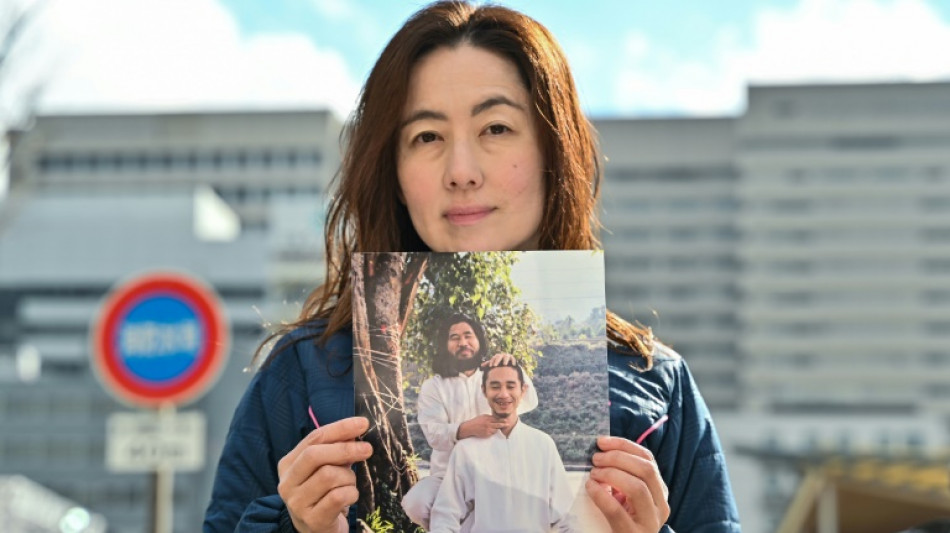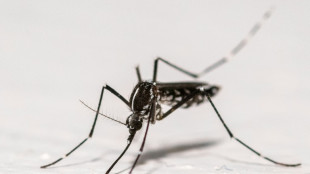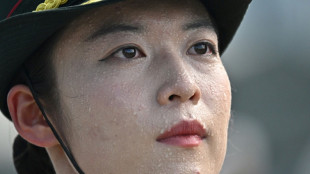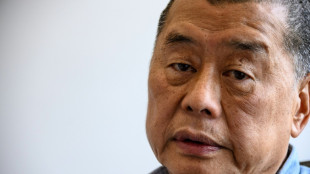
-
 Arsenal could hijack Spurs' bid for Palace star Eze - reports
Arsenal could hijack Spurs' bid for Palace star Eze - reports
-
Namibian Shalulile equals South African scoring record

-
 PlayStation prices rise as US tariffs bite
PlayStation prices rise as US tariffs bite
-
Games publisher kepler on cloud nine after smash hits

-
 Thirteen arrested over murders of Mexico City officials
Thirteen arrested over murders of Mexico City officials
-
Seville storms past Lyles for Lausanne 100m win

-
 Google unveils latest Pixel phones packed with AI
Google unveils latest Pixel phones packed with AI
-
Brazil records 65 percent drop in Amazon area burned by fire

-
 Threat from massive western Canada wildfire eases
Threat from massive western Canada wildfire eases
-
England women's rugby coach Mitchell says World Cup favourites' tag 'irrelevant'

-
 US ramps up attack on international court over Israel
US ramps up attack on international court over Israel
-
Palace transfer targets Eze and Guehi to start in European tie

-
 North Carolina coasts prepare for flooding as Erin churns offshore
North Carolina coasts prepare for flooding as Erin churns offshore
-
India test-fires ballistic missile ahead of US tariff hike

-
 Antarctic climate shifts threaten 'catastrophic' impacts globally
Antarctic climate shifts threaten 'catastrophic' impacts globally
-
Tall ships sail into Amsterdam for giant maritime festival

-
 Trump raises pressure on central bank, calls for Fed governor to resign
Trump raises pressure on central bank, calls for Fed governor to resign
-
Woods to head PGA Tour committee to overhaul golf

-
 Google packs new Pixel phones with AI
Google packs new Pixel phones with AI
-
How Europe tried to speak Trump

-
 Ombudsman gives Gosden another International, Derby hero Lambourn loses
Ombudsman gives Gosden another International, Derby hero Lambourn loses
-
Eurovision returns to Vienna, 11 years after Conchita Wurst triumph

-
 England expects at Women's Rugby World Cup as hosts name strong side for opener
England expects at Women's Rugby World Cup as hosts name strong side for opener
-
Marseille's Rabiot, Rowe up for sale after 'extremely violent' bust-up: club president

-
 French champagne harvest begins with 'promising' outlook
French champagne harvest begins with 'promising' outlook
-
England unchanged for Women's Rugby World Cup opener against the USA

-
 Stock markets diverge as traders eye US rate signals
Stock markets diverge as traders eye US rate signals
-
Russia says must be part of Ukraine security guarantees talks

-
 Historic Swedish church arrives at new home after two-day journey
Historic Swedish church arrives at new home after two-day journey
-
Winds complicate wildfire battle in Spain

-
 Nestle unveils method to boost cocoa yields as climate change hits
Nestle unveils method to boost cocoa yields as climate change hits
-
UK set for more legal challenges over migrant hotels

-
 Russia says discussing Ukraine security guarantees without Moscow 'road to nowhere'
Russia says discussing Ukraine security guarantees without Moscow 'road to nowhere'
-
Torrential Pakistan monsoon rains kill more than 20

-
 Record number of mosquito-borne disease outbreaks in Europe: health agency
Record number of mosquito-borne disease outbreaks in Europe: health agency
-
Stock markets diverge after Wall Street tech sell-off

-
 Chinese troops swelter through rehearsal for major military parade
Chinese troops swelter through rehearsal for major military parade
-
Defence begins closing arguments in Hong Kong trial of Jimmy Lai

-
 World champions Springboks to play Japan at Wembley
World champions Springboks to play Japan at Wembley
-
Kneecap rapper in court on terrorism charge over Hezbollah flag

-
 Israel approves plan to conquer Gaza City, calls up reservists
Israel approves plan to conquer Gaza City, calls up reservists
-
Oasis star Noel Gallagher piles praise on 'amazing' brother Liam

-
 German minister says China's 'assertiveness' threatens European interests
German minister says China's 'assertiveness' threatens European interests
-
Afghanistan bus crash death toll rises to 78

-
 Historic Swedish church inches closer to new home
Historic Swedish church inches closer to new home
-
Israel defence minister approves plan to conquer Gaza City

-
 More than 20 dead in fresh Pakistan monsoon rains
More than 20 dead in fresh Pakistan monsoon rains
-
Brazilian goalkeeper Fabio claims world record for most games

-
 Vienna chosen to host Eurovision 2026
Vienna chosen to host Eurovision 2026
-
Japan hosts African leaders for development conference


Japan cult widow speaks 30 years after subway attack
Only seven years into her marriage did Yuki Niimi first touch her husband -- at a morgue where she collected his body after he was executed and kissed him in a coffin.
Before that a glass screen had always separated her from her death-row spouse Tomomitsu Niimi, a notorious member of the Aum Shinrikyo doomsday cult that 30 years ago orchestrated a nerve agent attack on Japan's capital.
On March 20, 1995, Aum members released sarin on five Tokyo subway trains, killing 14 people and sickening thousands more.
"Until the very end, he gave no apology to those who died. He didn't regret what he did. He just followed the path he believed in," Yuki, 47, told AFP in an interview.
Yuki herself is a former member of an Aum successor group who despite her denials was once convicted for using intimidation to try to recruit an acquaintance for the sect.
Given the magnitude of her husband's crimes, she believes the death penalty was "unavoidable", and that "paying restitution" is the only way Aum cultists can atone.
Under the thrall of the wild-haired, near-blind guru Shoko Asahara, Aum devotees believed Armageddon was coming and saw massacres as an altruistic way to elevate souls to a higher realm.
Disaffected young people in Japan, including doctors and engineers who later manufactured toxins, took solace in Asahara's doctrines.
Among his most loyal mentees was Tomomitsu, who was behind bars when he met Yuki, and when they married in 2011.
Their relationship consisted of letters and 15 to 30 minutes of conversation, almost every day, under a guard's supervision.
But it ended abruptly with his execution in summer 2018, along with 12 other Aum members including Asahara.
After his hanging, the widowed Yuki caressed the still-warm body of Tomomitsu, whose neck was wrapped in a bandage to conceal the mark left by the noose.
She then spent the next three days until his cremation lying alongside him at home.
"He didn't look like he suffered at all. He might as well have been asleep," she said.
- 'Blood-stained' -
Tomomitsu, who died aged 54, is sometimes called Aum's "most blood-stained" disciple -- having helped perpetrate all of the group's seven deadly attacks, including the subway strike in which he acted as a driver.
He also fatally suffocated a sleeping one-year-old in the 1989 slaying of an anti-Aum lawyer and his family.
The Aum cultists, who shut themselves away incommunicado in the pre-internet era, "believed everything" Asahara said and "honestly thought they were helping his act of salvation", Yuki said.
She showed AFP a photo of a youthful, smiling Tomomitsu, sitting cross-legged with the cult leader behind him, both dressed in loose, bright white robes.
However, around a month before Tomomitsu's execution, she sensed his allegiance to his leader finally crumbling.
"He called him just 'Asahara' -- that had never happened before in the 12 or so years we were together. It was unthinkable, after all these years of referring to him as 'guru' or 'master'," she said.
Then, in his diary, "in the final days of his life, he expressed clearly that 'I am not following him any more'."
He wrote that he had come to realise that Asahara's teachings about karma were a fallacy, Yuki said.
Also, despite Tomomitsu's lack of remorse, "I asked why Aum carried out the subway gas attack, and my husband clearly told me that the guru was sick, mentally ill," she added.
"Followers still say the guru had profound thoughts to justify it, but, no way. He was mentally sick."
- 'Love at first sight' -
The 1995 subway poisonings shocked the world and prompted a reckoning on extremism in Japan, with a crackdown on Asahara's empire that once counted more than10,000 followers.
Its successor groups continue to operate and recruit today, with their numbers estimated at 1,600 domestically.
Two of these groups, Aleph and Hikarinowa, operate openly in Japan, which some experts say make them easier to monitor.
Yuki joined Aleph in 2002, with her curiosity about mysticism eclipsing her fears of Aum, she said.
For her, the cult's key allure was the idea that through its training, including chanting and intense spiritual meditation sessions, she could be reborn into a "celestial world" where there is "no suffering from disease or love".
One day she went to see Tomomitsu behind bars to seek his "top-tier" advice, only to "fall in love at first sight".
"My feelings towards him were not only romantic, but akin to worship," she said.
The lovestruck Yuki gradually lost interest in Aleph and quit in 2012.
But little has since changed about Aleph, whose altars are still adorned with framed pictures of Asahara.
"There is no way they will ever change," Yuki said.
Asahara's death has "done nothing to weaken their faith, the way Jesus in Christianity is immortalised", she said.
Japanese authorities say Aleph members routinely chant allegiance to their demised master and wear special headgear said to be imbued with his brain waves.
Yuki believes that the failure of family relationships is the main reason some young people lose themselves in spirituality, recalling her own sometimes controlling mother.
"Had they built a good relationship with their parents, I don't think they would've sought solace in cults," she said.
Yet with her husband gone, the family she once struggled with is now what anchors her life.
"Aleph and Aum deny everything about your family or friends, but now, these people are what I live for."
A.Ammann--VB
